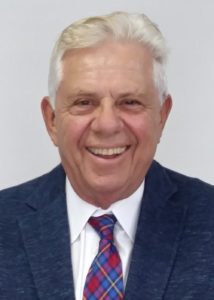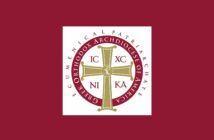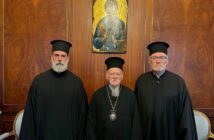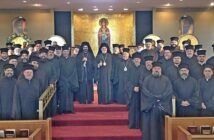I am a third-generation member of the Orthodox Christian Church in the United States, dating back to 1906, when my paternal grandparents settled in Springfield, MA, and then Poughkeepsie, NY (1908), when my maternal grandfather settled in Pittsburgh, PA. At 28 years old, my grandmother died of the Swine Flu in that city in 1918, leaving a 3-month newborn and a 4-year-old child. Eventually, this branch of the family settled in Garden City, L.I., N.Y. I grew up with my parents in Jersey City in 1942. My views on this Greek Orthodox Archdiocese Charter development process relate to this impressionistic immigrant and assimilationist history of my American Experience. I have been a sacramental adherent and active member in all aspects of the growth and development of the Greek Orthodox Church. I am a member by choice and based on my extended family participation, I am a remnant member.
My assimilated immigrant forbearers were actively involved in developing local churches wherever they settled. In Poughkeepsie, my grandparents housed the itinerant priest who conducted services when he could. My grandmother was President of the Philoptochos in 1932 at Evangelismos Greek Orthodox Church in Jersey City. My father and uncle served on the parish council of that church for many years and were the driving forces involved in building a new sanctuary in 1956. The Long Island branch actively developed St. Paul Parish in Hempstead, and my aunt was a driving force on the cookbook committee.
These immigrants and first-generation folks built the infrastructure of the church. They also participated in the American Hellenic Educational Progressive Association (AHEPA), advocating education and citizenship since its start. My father served as District Governor in the mid-1950s, and I am a 63-year member. The idea of re-Hellenization of the faithful and that teaching the Greek language will retain our children and young adults is not the church’s work. Developing Orthodox Christian Education and lifelong learning is a better alternative. Keeping our funds here in the USA, building up a world-class College, developing full care facilities for the elderly in each Metropolis, and actively promoting Orthodox Christian unity are ways to retain our faithful.
Listening to the Archbishop’s February 2023 address to the GOA Chamber of Commerce (known as Leadership 100) expressing his vision for the new Charter, we agree that the stakes are high. We are losing the future because we are different today from one hundred and fifty years ago. We were a grassroots church 100 years ago, respecting our adopted country and using its ethos and laws to build up the body of Christ. The hierarchs who governed until 1994 respected the laity (laos) and were parish-centered, working in synergy with the laity and they with the Archdiocese. The administration of the church through its mixed councils included the active and dynamic participation of the laity. There was respect for the laity.
This changed after 1994 with the retirement of Archbishop Iakovos and was formalized in 2003 with the 5th Charter given to us as “a gift from the Patriarchate.” Indeed, the changes were brought about because the Patriarch himself chose to see himself as a superpower and a global leader. His survival depended on reinventing himself. As a result, he decided to divide and conquer Orthodox Christians in North America. This fragmentation and elimination of the active participation of the laity is the direct result of this survival mode of the Patriarchate and its need to impose a charter created without the input of the laity. The assignment of Archbishop Spyridon and the imposition of a new charter represent the takeover of the Archdiocese by a global Patriarch who uses this geographic area to bolster himself.
The Patriarch appointed a Patriarchal nuncio within the Archdiocese to set up a two-tier church. Foundations were established to siphon off funds from the mission and work of the church in the United States. These funds are sent abroad to bolster the Patriarchate. Leadership 100 and The Archons are set aside from the rest of the faithful in a priority category. They network and are continually showered with honors and glory. The rank-and-file laity and parish leaders are continually asked to give more and more to keep the parishes afloat. We must ask, how do the Archdiocese and Metropolises support the parishes? The new Charter must address this fragmentation.
The canonical order of the church, its history, and theology clearly show: where the bishop is, so there is the church. The church is not a colony to be governed from abroad for reasons to bolster a titular hierarchy or ancient patriarchates. The church is a mission unto the world. Historically, Orthodox ecclesiology and missionary outreach has respected the culture and language with which it engages. The Charter is a missionary document. Archimandrite Roman Braga, held captive in Romania in the Communist period, observed and taught, “Orthodoxy is the same everywhere.” In America, it “must bear the mark of the nation… If the missionaries are wise, they will sense and understand the character of their nation…This is a utilitarian nation, and I think Orthodoxy here will be practiced for the benefit of many nations.” Furthermore, he believed that the utilitarian nature of the American Church enhances charity and the help of the community. These historical truths and realities must govern the Charter. The Archdiocese in America must serve the needs of the faithful in America.
As the process continues, we must ask: what happened to the work of the first committee consisting of 80 members suggested by the Archbishop and Metropolitans? They met once or twice. Where are copies of their work? Were the committee members formally dismissed?
Who picked the members of a new committee established and meeting in Istanbul after the Clergy-Laity Congress held in New York in July 2022?
Why does this committee meet in Istanbul when making a charter for the Archdiocese in the United States?
Have all those officially discussing the Charter studied and been guided by the questions and comments presented in the open discussion on the Charter held at the Clergy-Laity Congress in one of its last sessions? Why is Metropolitan Savas not part of this Charter Development Committee?
George Matsoukas
Related Resources
Video Q&A Following Archbishop Elpidophoros’ Presentation to Leadership 100
A Declaration for Orthodox Christian Unity in America





6 Comments
I was a member of the 80+ person original committee that was jointly appointed by the Metropolitans and the Archbishop that Mr. Matsoukas referred to.
I took my responsibility seriously, devoting considerable time and thought to the assignment and submitted my input to the independent company hired to collect input from every member of the committee in order to inform and advise those who would be tasked with drafting the proposed new charter.
None of my input was used (https://ocl.org/looking-ahead-to-2022-perspectives-on-the-process-of-drafting-the-new-goa-charter/).
It has been reported that the Barna company, the supposed independent, professional survey group, submitted the input for editing by the Archbishop and his advisors. The so-called survey questions where slanted; the answers ultimately ignored.
So much for the promised input from the parishes, clergy, and laity of the Archdiocese.
Instead of opening up and improving the process to ensure that the experience and energy of the faithful in America would be reflected in any proposed new charter, the Patriarchate and Archbishop doubled down on a process that excludes the input of clergy and laity of America .. including, apparently, the Metropolitans and Metropolis Councils.
I was not a delegate to the Greek Archdiocese Clergy-Laity Congress last year, but from Mr. Matsoukas’s report, it appears that any input from the delegates is also being ignored.
The speech of the Archbishop to Leadership 100 (https://youtu.be/_YNZBmPLxW8) is remarkably tone-deaf and denigrating not only to the faithful of the Greek Archdiocese but to the other Orthodox bishops in the Assembly of Bishops and their flocks.
The Archbishop’s claim that without the Ecumenical Patriarchate, the generations of Orthodox in America that Mr. Matsoukas describes and celebrates would be nothing more than another Protestant mega-church, requires an immediate retraction and apology.
How can the Archbishop hope to preside at meetings of the Assembly of Bishops after expressing these sentiments?
Was the Archbishop sent to America to further the work of the Assembly and support the work of the Metropolitans of the Archdiocese, or to further divide the Church in America and weaken the parishes and Metropolises?
George, thank you for your input and insight. It is unfortunate that your input and that of many others was not valued and totally dismissed. The problem with Elpi is his over emphasis in the Patriarch and not Christ. Christ is the foundation of the Church and no one else. I have read through much of what the AB presents and there is more mention of the Patriarch than there is of Christ. The psalmist puts it this way, trust not in princes or sons of men because there is no salvation in them.
The points made by George Matsoukas concerning the background and context of the proposed revision of the Charter deserve prayerful attention and continuous reflection on the part of all the faithful and especially clergy and laity leaders of the Church.
Fr. Theodore Stylianopoulos
Fr. Theodore somewhat offers nothing but prayerful attention and continuous reflection in response to the comments of the two Georges about the background and context of the on-again, off-again effort by Pat. Bartholomew and Arch. Elpidophoros to revise the Charter of the Archdiocese.
According to Fr. Stylianopoulos, these prayers and reflections should be offered by “all faithful and especially clergy and lay leaders of the Church.” By which he presumably means the Greek Orthodox Archdiocese since the Charter relates only to that part of “the Church” in America.
So, who are these clergy and lay leaders? Do they have a voice? Do they have a vote?
Is Fr. Theodore referring to the Retired Clergy Association? The Clergy Brotherhood? The Parish, Metropolis, and Archdiocesan Councils? Should the delegates to Metropolis Assemblies and Clergy-Laity Congresses be praying and reflecting? Not likely.
None of the clergy and lay leaders in America have been consulted. None have spoken. None have acted. How likely is it that their prayer attention and continuous reflection will amount to anything?
Not even the Metropolitans of the Eparchial Synod, who are supposed to be the ones from whom any request for revision should have come, have spoken or acted. They have been invited to Istanbul, where they will go along knowing that if they don’t swallow what’s served to them, they will be retired or assigned to a Diocese somewhere in Anatolia that no longer has any Christians for them to minister to.
What Fr. Ted and almost everyone else who is following this saga know is that this entire kabuki show is a farce. The Patriarch and Archbishop have already written the new charter and are simply going through the motions of wrapping it up and presenting it as their “gift” to the Church in America.
What the Phanariotes in Istanbul need to understand is that any Charter that doesn’t grant full autonomy to the Archdiocese in America will be viewed as illegitimate and will hasten the calls for autocephaly.
Greetings JK,
In all humility, I must commend you for your continual emphasis on our Lord and Savior Jesus Christ. It is very refreshing and uplifting. Of course, the whole purpose of Orthodox Christian Laity is to exalt our Lord and Savior Jesus Christ. Many thanks to the two Georges for all you do for Christ and His church!!
May His name be glorified. Peter, blessed Pascha.